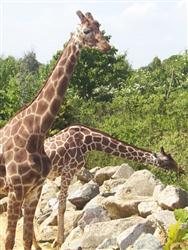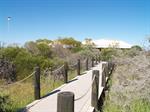Work in the exciting and growing field of environmental industry
This flexible certificate level course in Environmental science enables you to choose a course to suit your interests and requirements. There are four core modules of Introduction To Ecology, Conservation and Environmental Management, Environmental Assessment and Wildlife Management. You then choose two elective modules of your choice.
- Build a solid foundation knowledge of Environmental Science

- Give yourself a head start when applying for jobs in the Environmental field
- Gain a greater understanding of ecological processes and the interconnectedness of species and habitats.
COURSE STRUCTURE: This course consists of 6 modules.
START DATE: Start at anytime to suit YOU.
COURSE DURATION: 600 hours
COURSE CONTENT: To obtain this certificate you must satisfactorily complete all assignments and pass an exam in each of the following six subjects. (Click on modules for more detail)
There are four Compulsory Modules -
Environmental Assessment
Wildlife Management
Introduction to Ecology
Conservation and Environmental Management
You then choose two elective modules from the list given below -
More Information on the Modules -
INTRODUCTION TO ECOLOGY (BEN101)
 This subject has 7 lessons as follows:
This subject has 7 lessons as follows:
- Ecosystems and Populations
- The Development Of Life
- Animals, Parasites and Endangered Species
- Fungi, Tundra, Rainforests and Marshlands
- Mountains, Rivers and Deserts
- Shallow Waters
- Ecological Problems
WILDLIFE MANAGEMENT (BEN205)
The course is divided into nine lessons as follows:
- Introduction To Wildlife Management
- Wildlife Ecology
- Wildlife Habitats
- Population Dynamics
- Carrying Capacity
- Wildlife Censuses
- Wildlife Management Techniques
- Wildlife Management Law And Administration
- Wildlife Management Case Study Research Project
CONSERVATION AND ENVIRONMENTAL MANAGEMENT (BEN201)
 This course has 8 lessons as follows:
This course has 8 lessons as follows:
- An Introduction To Ecology
- A Perspective On Environmental Problems
- Pollution and Industry Effects On The Environment
- Water and Soil
- Vegetation Conservation and Management
- Animal Conservation and Management
- Marine Conservation and Management
- The Future
ENVIRONMENTAL ASSESSMENT (BEN 301)
There are 8 lessons in this course as follows:
- Types of Employment for Environmental Scientists
- Introduction to Environmental Assessment
- International Environmental Law
- Domestic Environmental Law
- Types of Environmental Assessments
- The Design and Process of Environmental Assessment
- Writing Environmental Reports
- Research Project - The student will carry out a small environmental assessment and write it up as a professional report.
Examples of elective modules -
TREES FOR REHABILITATION (BHT205)
There are ten lessons are as follows...
- Approaches To Land Rehabilitation
- Ecology Of Soils And Plant Health
- Introduction To Seed Propagation Techniques
- Propagation And Nursery Stock.
- Dealing With Chemical Problems
- Physical Plant Effects On Degraded Sites
- Plant Establishment Programs
- Hostile Environments
- Plant Establishment Care
- Rehabilitating Degraded Sites
BOTANY I (Plant Physiology and Taxonomy) (BSC104)
The course is divided into 10 lessons as follows:
- Taxonomic Classification of Plants
- Cells and Tissues
- Specific Vegetative Parts of a Plant
- Flowers and Fruit
- Seed and the Developing Embryo
- Photosynthesis and Growing Plants
- Respiration
- The Role of Water
- Movement of Water and Assimilates through a Plant
- The Effects of Tropisms and Other Growth Movements
 EARTH SCIENCE (BEN204)
EARTH SCIENCE (BEN204)
There are nine lessons in this module as follows:
- Structure and Forces
- Rocks and Minerals
- Surface Changes
- The Oceans
- Air and Weather
- The Greenhouse Effect
- Global Weather Patterns
- Geological Time
- Modern Environmental Issues
ECOTOUR MANAGEMENT (BTR101)
There are nine lessons in this module as follows:
- Nature and Scope of Ecotourism
- Management Issues
- Industrial Destinations
- The Tour Desk/Office
- Accommodation Facilities
- Catering Facilities
- Legal Considerations
- Safety
- Planning an Ecotourism Activity
WILDLIFE CONSERVATION (BEN206)
There are ten lessons in this module:
- Introduction to Wildlife Conservation
- Recovery of Threatened Species
- Habitat Conservation
- Approaches to Conservation of Threatened Species
- Vegetation Surveys
- Fauna Surveys
- Marine Conservation
- Planning for Wildlife
- Management
- Wildlife Conservation Project
Fee Payment Options
You can pay either
- Full Fees
- As a two part payment plan
- As a four part payment plan
If you pay in full on enrolment, the fees are discounted.
If you pay in 2 parts, the first half of the course is supplied initially; and the second part payment is not made until you have completed the first half (at which time the second half of the course is supplied).
If you pay in 4 parts, the first half is still supplied; you are then billed a second payment (due 2 months later). The third payment becomes due when you commence the second half of the certificate.The fourth part is due 2 months after that.
Career Tips
Qualifications are essential for furthering your career in Environmental Studies, however there are many other things you can do to get ahead. These include:
- Experience tips - unpaid or paid, experience is highly valued by future employers.
- Networking tips - become a member of relevant environmental networking groups and join website groups related to your field.
- Membership - become a member of relevant groups in your field eg. the Mammal Society or Bird Observer Clubs. This is another way to demonstrate your commitment to your career.
Why Study the Course?
This is a great course to choose, if you want to not only learn about the subject now;
but keep learning after you finish studying. We believe a good course should not only
develop intelligence and knowledge; but also:
- Improve your ability to communicate with others within the discipline
- Develop problem solving skills relevant to this discipline
- Expand awareness and develop creativity
- Facilitate networking (develop contacts within an industry)
- Develop attributes that set you apart from others in your industry
- Motivate you, build confidence, and more
According to some authorities, success is actually only affected about 20% by your knowledge and intelligence.
Our school works at helping you in a holistic way, to develop all of the things
mentioned above, in a way that relates to the discipline you are studying; and
in this way, giving you the capacity to apply yourself to unanticipated problems,
to understand new information as it emerges, to see and seize on new opportunities
as they reveal themselves, and to continue to grow your abilities within your discipline
as you progress through life after study.
In a world that is changing faster all the time; it is difficult to even be certain how this industry
might change between the start of your course, and the time you finish studying.
With this in mind; any course that is to have long term value in today's world, must develop
broad generic skills (as above). This approach to education is not unique to ACS, but it is
an approach tested, proven and adopted in our courses; and an approach that is also used
by some of the most successful, cutting edge universities and colleges around the world.
WHAT NEXT?
Register to Study -Go to panel toward top of this page (right column)
or
Get Advice -Use our FREE COUNSELLING SERVICE to contact a tutor
CLICK TO CONTACT US